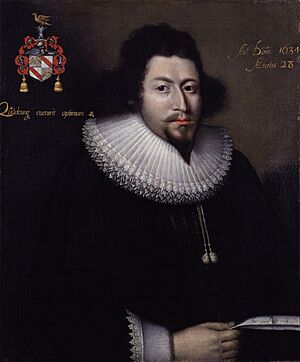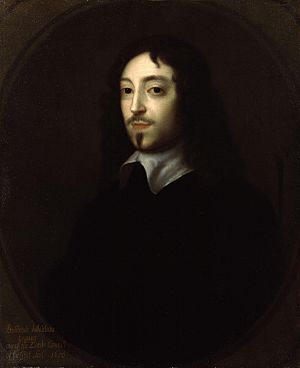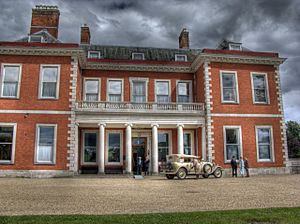Bulstrode Whitelocke facts for kids
Sir Bulstrode Whitelocke (born August 6, 1605 – died July 28, 1675) was an important English lawyer, writer, and politician. He served in the English Parliament and held a very high position as the Lord Keeper of the Great Seal of England. This meant he was in charge of important government documents and legal matters.
Contents
Early Life and Education
Bulstrode Whitelocke was born in London on August 6, 1605. His parents were Sir James Whitelocke and Elizabeth Bulstrode. He was named "Bulstrode" after his mother's family.
He went to school at Eton College and Merchant Taylors' School. Later, he studied at St John's College, Oxford, which is part of the University of Oxford.
Starting His Career
Bulstrode Whitelocke left Oxford to study law at the Middle Temple, one of England's famous law schools. He became a lawyer in 1626. He enjoyed sports and music. In fact, he helped organize the music for a big show called "The Triumph of Peace" in 1633. This show was performed for the King and Queen.
He also worked as a legal advisor for several towns. He was the Recorder (a type of judge or legal officer) for Abingdon, Oxford, and Bristol.
Becoming a Politician
Whitelocke was first elected to Parliament in 1626, representing Stafford. In 1640, he became a Member of Parliament for Great Marlow in what was known as the Long Parliament.
He played a key role in important political events. For example, he helped lead the case against Strafford, a powerful figure. He also helped create a law that said Parliament could only be ended if Parliament itself agreed. He supported the Grand Remonstrance, which was a list of complaints against King Charles I.
His Role in the Civil War
When the English Civil War began, Bulstrode Whitelocke supported the Parliament. He used his influence to stop the King from gathering soldiers in areas like Buckinghamshire and Oxfordshire.
He was sent to negotiate with King Charles in 1643 and 1644. He tried to find a peaceful solution. He was also one of the people involved in the Treaty of Uxbridge in 1645, which was another attempt to make peace.
Even though he tried to make peace, he disagreed with some politicians who wanted to get rid of the army. He also believed in religious tolerance, meaning people should be free to practice their own religion. Because of this, he became closer to Oliver Cromwell and the Army Party. However, he did not take part in the King's trial.
After the King was executed and the Commonwealth was formed, Whitelocke was part of the Council of State. He even suggested to Cromwell that the Royal Family should be brought back to England.
Ambassador to Sweden
In 1653, Bulstrode Whitelocke was sent on an important trip to Queen Christina of Sweden. His job was to create a treaty of alliance between England and Sweden. This treaty was important for trade and peace. Because of this mission, he is now seen as England's first Ambassador to Sweden. He was made a knight in 1654.
Return to Britain and Later Work
When he returned to England, Whitelocke continued his work in government. He was a Commissioner of the Great Seal again and also helped manage the country's money. He was elected to Parliament for Buckinghamshire in 1654.
Whitelocke was a very skilled lawyer. He supported changes to make the legal system better, like using English in court instead of Latin. He also tried to stop changes to the Court of Chancery that he thought were not good. This led to him being removed from his position as Commissioner of the Great Seal in 1654.
Despite this, he remained friends with Cromwell, who respected him. He continued to advise Cromwell on foreign affairs and helped with another treaty with Sweden in 1656. He also suggested that Cromwell should become King to make the government more stable.
Under Richard Cromwell
When Richard Cromwell, Oliver's son, became the new leader, Whitelocke was again given the Great Seal. He had a lot of influence during Richard's short time in power. He continued to serve in Parliament and on the Council of State.
End of His Career
As the monarchy was about to be restored, Whitelocke tried to prevent George Monck from bringing King Charles II back without conditions. However, his efforts were unsuccessful.
After his plans failed, he retired to the countryside. Whitelocke was known for being fair and sensible throughout his career. He believed it was important to keep the country's government running, which is why he worked with Cromwell. He was not overly ambitious and was willing to give up high positions for what he believed was right. Because of his good reputation, he was not punished when the King returned in 1660. He was allowed to keep most of his property.
Family Life
In 1651, Whitelocke bought Greenlands House in Berkshire. This property gave him control over three miles of the River Thames. Today, this site is home to Henley Business School. He also inherited Fawley Court in Buckinghamshire from his father in 1632. After this house was damaged during the Civil War, he gave it to his son, James. Bulstrode Whitelocke then lived quietly at Chilton Lodge in Wiltshire until he died on July 28, 1675, at the age of 69.
Whitelocke was married three times:
- In 1630, he married Rebecca Bennet. They had a son named James (1631–1701), who also served in Cromwell's army.
- In 1635, he married Frances Willoughby. They had nine children together. Their eldest son, William Whitelocke, was later knighted by King William III.
- Around 1651, he married Mary Carleton. They had four sons and several daughters.
Images for kids
 | Delilah Pierce |
 | Gordon Parks |
 | Augusta Savage |
 | Charles Ethan Porter |





